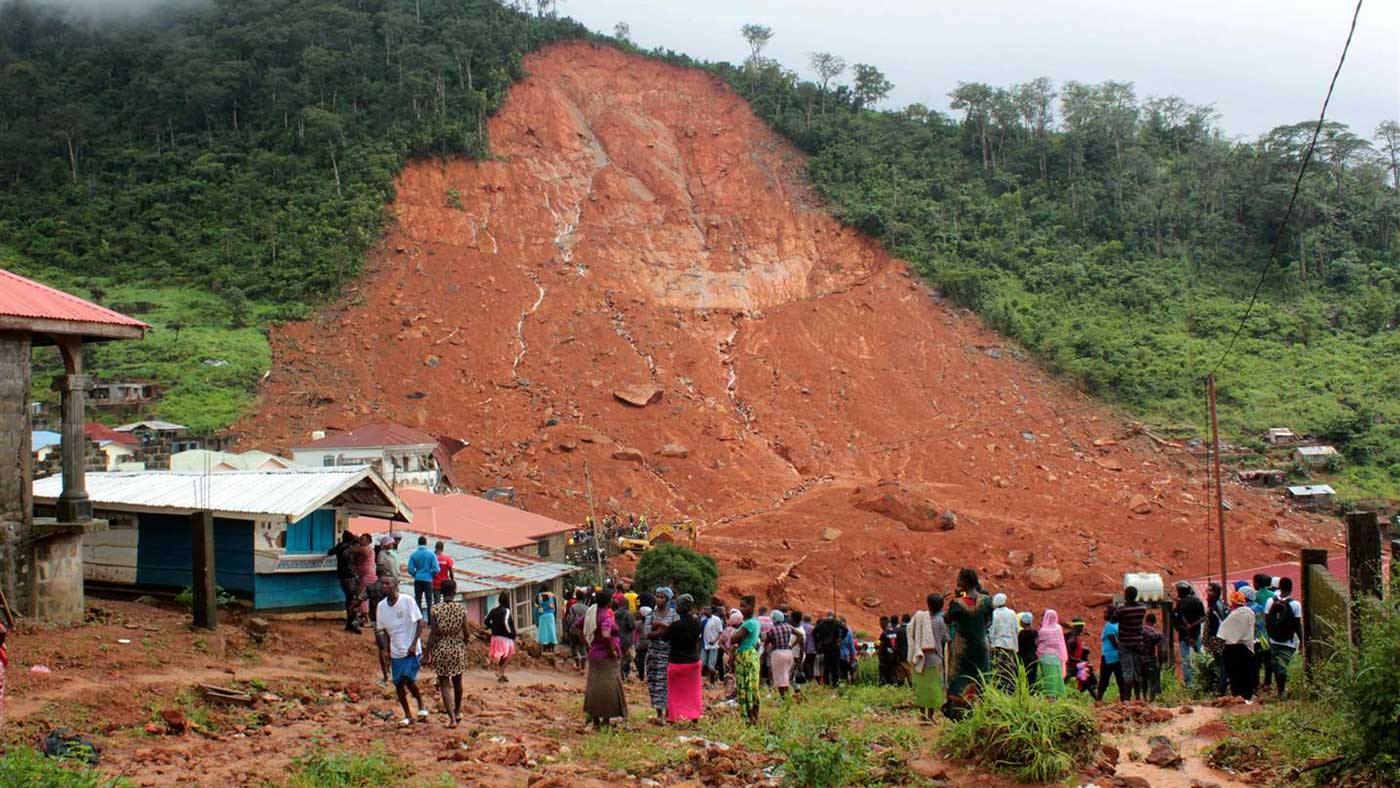Hundreds killed by Sierra Leone mudslide and flooding
Government appeals for international assistance as search continues for survivors

A free daily email with the biggest news stories of the day – and the best features from TheWeek.com
You are now subscribed
Your newsletter sign-up was successful
At least 400 people have been killed and an estimated 600 are missing after a mudslide and flooding engulfed an area on the outskirts of Sierra Leone's capital, Freetown.
President Ernest Bai Koroma pleaded for "urgent support", saying "entire communities had been wiped out," the BBC says.
"The magnitude of the destruction as a result of the disaster is such that the number of victims in the community who may not come out alive may likely exceed the number of dead bodies already recovered," a local resident told the Washington Post.
The Week
Escape your echo chamber. Get the facts behind the news, plus analysis from multiple perspectives.

Sign up for The Week's Free Newsletters
From our morning news briefing to a weekly Good News Newsletter, get the best of The Week delivered directly to your inbox.
From our morning news briefing to a weekly Good News Newsletter, get the best of The Week delivered directly to your inbox.
ABC News reports that the city's central morgue was "unable to accommodate all the bodies as victims continued to arrive".
"Our problem here is space. We are trying to separate, quantify, and examine quickly and then we will issue death certificates before the burial," morgue head Owiz Koroma said.
Aid workers are reporting extremely difficult conditions as rescue efforts continue for the estimated 600 people still missing since the incident.
"We have the mountains and very steep hillsides. [It's very hard to] access these areas, where it's muddy, it's slippery – there's a risk of a second landslide," UN worker Linnea Van Wagenen told The Guardian. "We're not sure how this massive landslide has affected the ground around it."
A free daily email with the biggest news stories of the day – and the best features from TheWeek.com
The Israeli Foreign Ministry reported that it had delivered 10,000 meals to Sierra Leone and is also planning to send medical aid.
-
 The ‘ravenous’ demand for Cornish minerals
The ‘ravenous’ demand for Cornish mineralsUnder the Radar Growing need for critical minerals to power tech has intensified ‘appetite’ for lithium, which could be a ‘huge boon’ for local economy
-
 Why are election experts taking Trump’s midterm threats seriously?
Why are election experts taking Trump’s midterm threats seriously?IN THE SPOTLIGHT As the president muses about polling place deployments and a centralized electoral system aimed at one-party control, lawmakers are taking this administration at its word
-
 ‘Restaurateurs have become millionaires’
‘Restaurateurs have become millionaires’Instant Opinion Opinion, comment and editorials of the day
-
 Epstein files topple law CEO, roil UK government
Epstein files topple law CEO, roil UK governmentSpeed Read Peter Mandelson, Britain’s former ambassador to the US, is caught up in the scandal
-
 Iran and US prepare to meet after skirmishes
Iran and US prepare to meet after skirmishesSpeed Read The incident comes amid heightened tensions in the Middle East
-
 Israel retrieves final hostage’s body from Gaza
Israel retrieves final hostage’s body from GazaSpeed Read The 24-year-old police officer was killed during the initial Hamas attack
-
 China’s Xi targets top general in growing purge
China’s Xi targets top general in growing purgeSpeed Read Zhang Youxia is being investigated over ‘grave violations’ of the law
-
 Panama and Canada are negotiating over a crucial copper mine
Panama and Canada are negotiating over a crucial copper mineIn the Spotlight Panama is set to make a final decision on the mine this summer
-
 Why Greenland’s natural resources are nearly impossible to mine
Why Greenland’s natural resources are nearly impossible to mineThe Explainer The country’s natural landscape makes the task extremely difficult
-
 Iran cuts internet as protests escalate
Iran cuts internet as protests escalateSpeed Reada Government buildings across the country have been set on fire
-
 US nabs ‘shadow’ tanker claimed by Russia
US nabs ‘shadow’ tanker claimed by RussiaSpeed Read The ship was one of two vessels seized by the US military